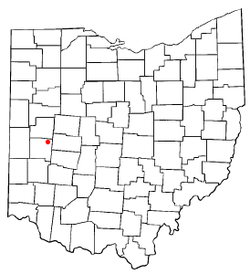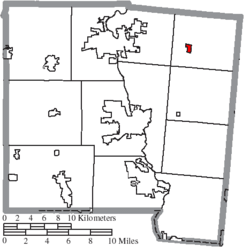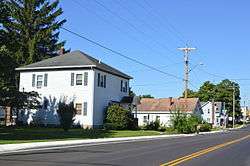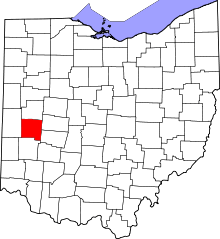Fletcher, Ohio
| Fletcher, Ohio | |
|---|---|
| Village | |
|
Houses on Main Street | |
 Location of Fletcher, Ohio | |
 Location of Fletcher in Miami County | |
| Coordinates: 40°8′39″N 84°6′42″W / 40.14417°N 84.11167°WCoordinates: 40°8′39″N 84°6′42″W / 40.14417°N 84.11167°W | |
| Country | United States |
| State | Ohio |
| County | Miami |
| Township | Brown |
| Area[1] | |
| • Total | 0.31 sq mi (0.80 km2) |
| • Land | 0.31 sq mi (0.80 km2) |
| • Water | 0 sq mi (0 km2) |
| Elevation[2] | 1,043 ft (318 m) |
| Population (2010)[3] | |
| • Total | 473 |
| • Estimate (2012[4]) | 476 |
| • Density | 1,525.8/sq mi (589.1/km2) |
| Time zone | Eastern (EST) (UTC-5) |
| • Summer (DST) | EDT (UTC-4) |
| ZIP code | 45326 |
| Area code(s) | 937 |
| FIPS code | 39-27412[5] |
| GNIS feature ID | 1048741[2] |
Fletcher is a village in Miami County, Ohio, United States. The population was 473 at the 2010 census. It is part of the Dayton Metropolitan Statistical Area.
History
Fletcher was platted in 1830.[6] The village was named after Samuel Fletcher, a local storekeeper.[7] A post office has been in operation at Fletcher since 1831.[8]
Geography
Fletcher is located at 40°8′39″N 84°6′42″W / 40.14417°N 84.11167°W (40.144266, -84.111725).[9]
According to the United States Census Bureau, the village has a total area of 0.31 square miles (0.80 km2), all land.[1] Fletcher is drained by East Branch Lost Creek and West Branch Lost Creek.
The village is crossed by U.S. Route 36 and State Route 589.
Demographics
| Historical population | |||
|---|---|---|---|
| Census | Pop. | %± | |
| 1850 | 246 | — | |
| 1860 | 298 | 21.1% | |
| 1870 | 306 | 2.7% | |
| 1880 | 384 | 25.5% | |
| 1900 | 375 | — | |
| 1910 | 376 | 0.3% | |
| 1920 | 369 | −1.9% | |
| 1930 | 407 | 10.3% | |
| 1940 | 436 | 7.1% | |
| 1950 | 515 | 18.1% | |
| 1960 | 569 | 10.5% | |
| 1970 | 539 | −5.3% | |
| 1980 | 498 | −7.6% | |
| 1990 | 545 | 9.4% | |
| 2000 | 510 | −6.4% | |
| 2010 | 473 | −7.3% | |
| Est. 2015 | 480 | [10] | 1.5% |
2010 census
As of the census[3] of 2010, there were 473 people, 175 households, and 133 families residing in the village. The population density was 1,525.8 inhabitants per square mile (589.1/km2). There were 197 housing units at an average density of 635.5 per square mile (245.4/km2). The racial makeup of the village was 97.0% White, 0.2% Native American, 0.6% from other races, and 2.1% from two or more races. Hispanic or Latino of any race were 0.8% of the population.
There were 175 households of which 40.6% had children under the age of 18 living with them, 56.6% were married couples living together, 11.4% had a female householder with no husband present, 8.0% had a male householder with no wife present, and 24.0% were non-families. 20.0% of all households were made up of individuals and 8.6% had someone living alone who was 65 years of age or older. The average household size was 2.70 and the average family size was 3.06.
The median age in the village was 36 years. 27.7% of residents were under the age of 18; 8.1% were between the ages of 18 and 24; 26.4% were from 25 to 44; 24.9% were from 45 to 64; and 12.9% were 65 years of age or older. The gender makeup of the village was 51.6% male and 48.4% female.
2000 census
As of the census[5] of 2000, there were 510 people, 189 households, and 144 families residing in the village. The population density was 1,651.8 people per square mile (635.2/km²). There were 207 housing units at an average density of 670.5 per square mile (257.8/km²). The racial makeup of the village was 98.04% White, 0.59% African American, 0.78% Native American, and 0.59% from two or more races. Hispanic or Latino of any race were 0.59% of the population.
There were 189 households out of which 37.6% had children under the age of 18 living with them, 61.4% were married couples living together, 10.6% had a female householder with no husband present, and 23.3% were non-families. 20.1% of all households were made up of individuals and 9.5% had someone living alone who was 65 years of age or older. The average household size was 2.70 and the average family size was 3.09.
In the village the population was spread out with 29.0% under the age of 18, 10.2% from 18 to 24, 29.4% from 25 to 44, 17.3% from 45 to 64, and 14.1% who were 65 years of age or older. The median age was 32 years. For every 100 females there were 103.2 males. For every 100 females age 18 and over, there were 104.5 males.
The median income for a household in the village was $41,583, and the median income for a family was $45,179. Males had a median income of $31,458 versus $26,125 for females. The per capita income for the village was $19,538. About 6.8% of families and 9.4% of the population were below the poverty line, including 8.8% of those under age 18 and 12.5% of those age 65 or over.
Economy
A Systemax factory is located just east of Fletcher.
Agriculture remains an integral part of life in Fletcher as the grain elevator, once owned by the Shepard Grain Company, is now owned by Urbana-based Champaign Landmark Inc.
An AT&T microwave radio relay tower (now abandoned) once provided several jobs for area residents. It remains standing (with the ear-shaped antennas now removed) a mile east of the village along U.S. Route 36. Ohio Bell operated the facility prior to the divestiture of the AT&T-owned Bell System in the 1980s. AT&T continued to operate the tower until the advent of fiber optic cables and satellites which led to the replacement for the underground coaxial cable network and the use of the 318-foot steel structure now sitting vacant within the eastern Miami County farm fields.
Notable person
- Thomas Charles Munger, judge
References
- 1 2 "US Gazetteer files 2010". United States Census Bureau. Retrieved 2013-01-06.
- 1 2 "US Board on Geographic Names". United States Geological Survey. 2007-10-25. Retrieved 2008-01-31.
- 1 2 "American FactFinder". United States Census Bureau. Retrieved 2013-01-06.
- ↑ "Population Estimates". United States Census Bureau. Retrieved 2013-06-17.
- 1 2 "American FactFinder". United States Census Bureau. Retrieved 2008-01-31.
- ↑ The History of Miami County, Ohio: Containing a History of the County; Its Cities, Towns, Etc. Windmill Publications. 1880. p. 317.
- ↑ Overman, William Daniel (1958). Ohio Town Names. Akron, OH: Atlantic Press. p. 45.
- ↑ "Miami County". Jim Forte Postal History. Retrieved 9 January 2016.
- ↑ "US Gazetteer files: 2010, 2000, and 1990". United States Census Bureau. 2011-02-12. Retrieved 2011-04-23.
- ↑ "Annual Estimates of the Resident Population for Incorporated Places: April 1, 2010 to July 1, 2015". Retrieved July 2, 2016.
- ↑ "Census of Population and Housing". Census.gov. Retrieved June 4, 2015.

